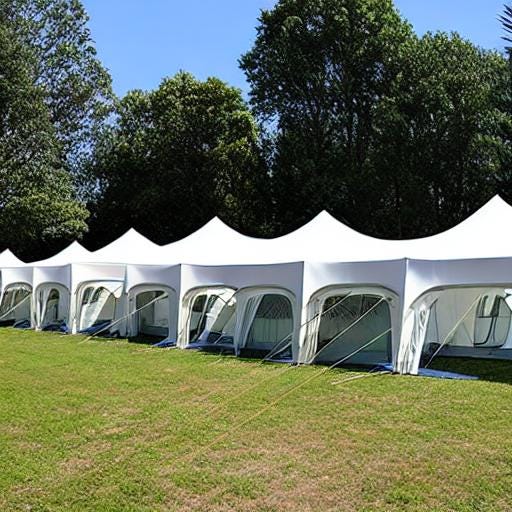A Two-Roomed Tent
Hardened Walls?
The Church of the Nazarene (COTN) started as a coming together of diverse holiness groups. That, and the revivalist origins, cause the COTN to describe itself as a “big tent.” Within the big tent, our beliefs are all centered in a core understanding of holiness. There has always been a sort of two roomed tent idea within the COTN. This is because of the original diversity of the holiness folk coming from Wesleyan traditions and the American Holiness movement folk who had non-Wesleyan ideas. For most of our existence, this was a friendly difference; I suspect the regional nature of these streams in North America kept everyone unified in diversity because there was not a lot of cross pollination. Once communication and the eventual arrival of the internet and social media, those differences became on full display. After our most recent quadrennial General Assembly 2023, I believe the older rooms have coalesced into rooms with more sturdy walls and possibly doors.
We are a global church, as we can see the diversity of cultures, languages, and even doctrinal understandings when we gather. For the most part, we are in harmony. But we have streams internationally now such that the old thinking of the Bresee camp (Wesleyan) and the American Holiness camp need new labels as we consider the wider global church. I propose that we have two main rooms in our big tent. These rooms are the Wesleyan-Holiness room and the Reformed-Holiness room. The latter adherents believe their understandings to be the only historic expression within the COTN, but they are incorrect. The tension between the two is getting more difficult to hold. This could be because of fear and misunderstanding. But we may need discussion over how we exist in harmony rather than animus.
One reason that the rooms have become more defined is that the core understanding of who we are as human beings living in holiness has a wider difference. Ironically, some of the Reformed-Wesleyan adherents were arguing against change, claiming it was being enacted because of generic evangelical beliefs. But some of the arguments against chnage leaned into those typically generic evangelical beliefs. These include the idea of sin as the beginning of humanity’s story, an assumption that penal substitutionary atonement is required, and concerns that dropping fear based understandings of hell would dilute the Gospel. Most of those have always fit within our tent except for insistence upon penal substitutionary atonement (PSA). I agree with Dr. H. Ray Dunning that PSA is incompatible within a Wesleyan context. (Dunning) This is key to recognizing the Reformed-Holiness stream becoming more coalesced around Reformed ideas rather than the American-Holiness tendency toward legalism.
I would argue that the concerns from the Reformed-Holiness camp on display at the recent GA highlight the influence of generic evangelical ideologies on their thinking. This was probably not a conscious decision, but one born within the idea that we need to fight against a perceived liberal or progressive threat. (I would argue that neither is a genuine threat to the COTN) The loud voices in our time fighting culture and religious “wars” over perceived threats are shaped by Reformed and Reformed adjacent ideas. These voices are pushing many toward a more fundamentalist ideology driven by Reformed ideas. This includes ideas such as a fully inerrant biblical text, depravity that cannot be transformed fully or mediated by prevenient grace, and PSA. I was honestly surprised when a leader in our denomination recently made the claim in a podcast that rejecting PSA is to reject Christian orthodoxy. (Speak) When asked if that was what he meant by discussing the idea of rejecting divine child abuse in the atonement, PSA was the doctrine given for that thinking.
When resolutions to better align some of our thinking on atonement and final judgement, the arguments became those of a fundamentalist approach to our doctrines, that change is something we do not and should not do. This seems a disingenuous argument from those propagating it based upon their own arguments that our Covenants should be considered essential doctrine. For context, those making this argument were also arguing for fundamental changes to statements within the Covenants.
I can hear the protests that I am ignoring the fact that the Wesleyan-Holiness room believes itself to be the better expression of holiness. I am not, because by and large the Wesleyan-Holiness room accepts the big tent philosophy and welcomes diversity. It is the Reformed-Wesleyans who want to shrink the tent and abandon the via media. I hope we can all remember how we once had unity in our diversity and quit treating this as a life and death, zero sum game. I am slightly pessimistic, because many of the Reformed-Holiness voices seemed angry when they opposed or supported a resolution. Their demeanor was one of conflict and anger.
But the Holy Spirit was also at work and in a moment when our denomination could have been irreparably harmed by outside agitation driving innuendo, gossip, and false witness, prayer calmed the room. Was this a temporary calm? I do not know, but my prayer continues to be that we continue to live within our tent as family rather than opponents.
Dunning, H. Ray. Grace Faith and Holiness “The logical conclusion of the penal theory is either universalism or a limited atonement. If Christ suffers the penalty for sin, the justice of God is satisfied, and therefore nothing further is needed.” (loca 6084 Kindle ed.)
Speak - “A Time To Speak With Brian Powell.” Season 1: Episode 5, “Progressive Christianity,” https://atimetospeak.buzzsprout.com/1923409/12497741–5-progressive-christianity




This is such a good and gracious post. I think a lot of folks respect Dunning, but haven’t actually read him. If they did, I don’t believe there would be as many adherents to PSA. But, like you said, diversity is good for challenging one another but Reformed-Holiness folks are usually into monoliths rather than variety